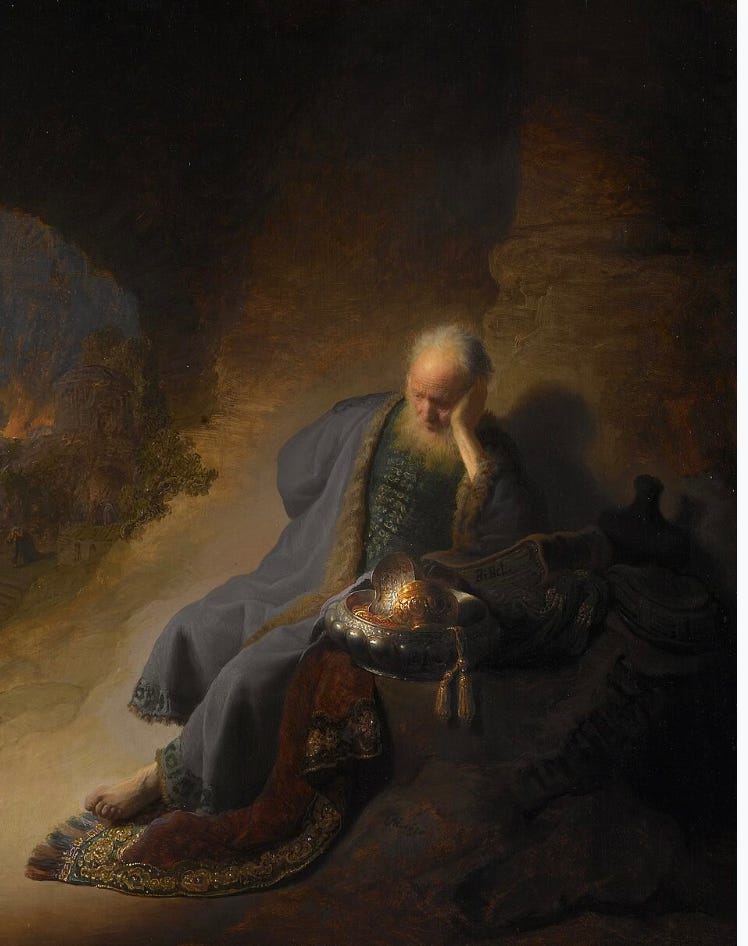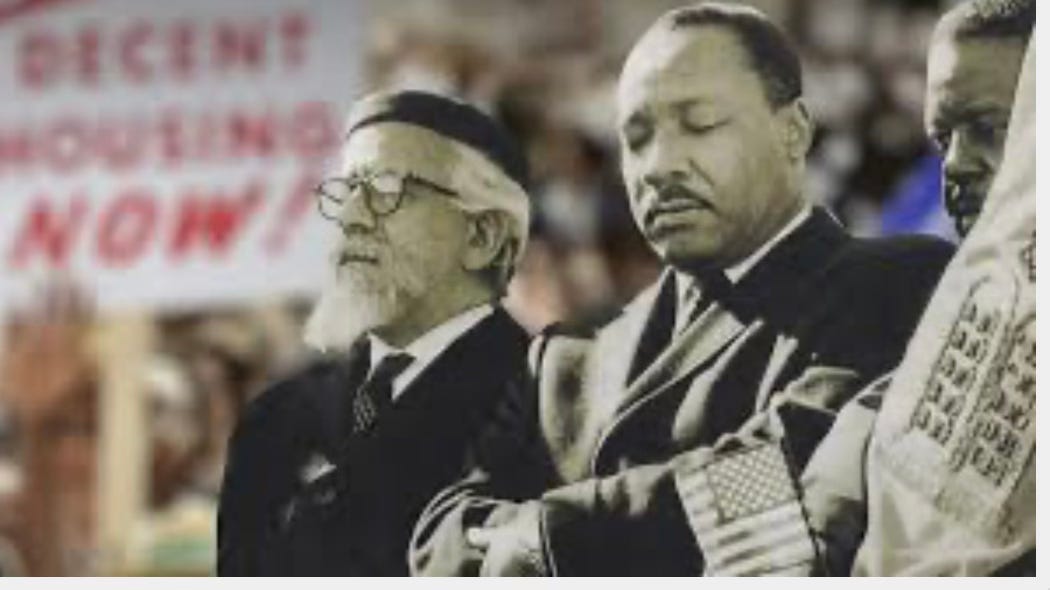About righteous anger the old Biblical prophets were never bested. I’ve been reading them––Isaiah, Amos, and others––men of outraged conscience who railed against injustice to the poor and the hypocrisy of their communities. They predicted that the moral failings they saw would lead God to send down terrible destruction.
In his book The Prophets, the 20th Century Jewish sage and activist Abraham Joshua Heschel writes
“The situation of a person immersed in the prophets’ words is one of being exposed to a ceaseless shattering of indifference, and one needs a skull of stone to remain callous to such blows. I cannot remain indifferent.” 1
I find myself in that very situation of immersion and shattering. Reading the prophets is an exalted form of doomscrolling.
I couldn't say I was happy
I’ve been writing quite a lot about the dangers and injustice of economic inequality. At the same time, I find my spirits brought low by what I see as the unremitting injustice, cruelty, and corruption of the Trump administration. I wish that wasn’t the case.
A good friend asked me recently how I was. I said I was okay. “Not happy?” he asked. I told him, no, I couldn’t say I was happy. He asked “what would make you happy.” I considered the question for a few seconds and then told him an end to our unfolding national nightmare.
When we had this conversation, I hadn’t yet immersed myself in the prophets. If I had, perhaps what would have come to mind is the verse below of the prophet Amos about a time of comeuppance for the evil and the indifferent
“…justice [will] well up like water, righteousness like an unfailing stream” 2
A prophet does not mince words
A central injustice that triggered the prophets’ fierce and unmovable contempt was the mistreatment of the poor by the wealthy.
I wouldn't be spared the prophets’ contempt. I do some things to alleviate poverty but the prophets would look at my style and scale of living, weigh me in the balance for what I could do vs. what I actually do, and skewer me for not doing more.
And perhaps the prophets’ anger would be even sharper against me because I don’t have the excuse of ignorance. I know too well how additional funds and additional time can change or save lives.
But even if I gave to the fullest extent, the prophets would still find fault. They’d ask, why had I waited so long? And why did I find their words necessary to do what should have come to me of my own accord?
I make the prophets sound unreasonable in their expectations but it’s their unreasonableness and demand for perfection that give their writing such force. A prophet does not mince words.
Below is a passage from the prophet Amos. He tells of God’s rage against inequality and its consequences.
“Hear this, you who trample upon the needy
And bring the poor of the land to an end,
Saying: when will the new moon be over
That we may sell grain?”
…And deal deceitfully with false balances
That we may buy the poor for silver
And the needy for a pair of sandals
And sell the refuse of the wheat.
…The Lord has sworn by the pride of Jacob;
Surely I will never forget any of [these] deeds.
Shall not the land tremble on this account,
And every one mourn who dwell on it.” 3
Collective suffering
It’s the wealthy who sin against the poor, but in Amos’ telling, everyone in the land will suffer in the earthquake, the trembling of the land, which is the trembling anger of the Lord. Everyone will suffer, the rich and the poor, the good and the evil, alike.
Last week I wrote against collective blame. Nevertheless, everyone suffers when a community is led astray by its leaders. 4
In American history it’s Abraham Lincoln who comes closest to speaking about moral failings and communal suffering in the language and cadences of a biblical prophet.
From his Second Inaugural:
“The Almighty has his own purposes. ‘Woe unto the world because of offenses! for it must needs be that offenses come; but woe to that man by whom the offense cometh’. ” 5 6
The offense is slavery. Lincoln says that if it’s God’s judgment to repay “every drop of blood drawn with the lash” with “another drawn with the sword,” he asks who are we to question God’s judgment?
Spare me the sound of your hymns
Services today consist of prayers, readings of scriptures, and sermons. When ancient prophets like Amos were afoot circa 750 BCE, the central ritual was the sacrifice of animals and of grain.
Amos saw great hypocrisy in sacrificial ceremonies conducted by immoral people who cared more about the ritual than they did about justice. He told the people that God saw their hypocrisy. On behalf of God, Amos denounced the rituals in especially harsh language:
“I (God) loathe, I spurn your festivals, I am not appeased by your solemn assemblies. If you offer me burnt offerings, or your meal offerings, I will not accept; I will pay no heed to your gifts of fatlings. Spare me the sound of your hymns, and let me not hear the sound of your lutes.” 7
Certainly, Amos brings us into the realm of impossible standards. There’s always some degree of suffering that is unhealed. There’s always some inequality between the poor and the rich, the weak and the powerful. There’s always congregants in any congregation who worship with unclean hands. In fact, none of us are morally perfect.
So, isn’t Amos being hysterical?
Here is Abraham Joshua Heschel’s answer.
“If such deep sensitivity to evil is to be called hysterical, what name should be given to the abysmal indifference to evil which the prophet bewails?” 8
That’s a tough question, and I don’t know how to answer it.
When it comes to evil, I hope there’s a middle ground between abysmal indifference and deep sensitivity.
My struggle is to be satisfied that I’m doing enough to combat what I see as injustice and not let things over which I have no control bother me so much. Writing this essay has helped.
Question for the comments: How do you balance your attention between your personal world and the wider world?
From The Prophets by Abraham Joshua Heschel
Heschel was a spiritual and intellectual giant of 20th century Jewish life. He was well known for his scholarship and his support of Martin Luther King and the Civil Rights Movement. His wonderful book on the prophets was published in 1962, The prophets was also the subject of his dissertation written in the early 1930’s in Germany. He got out just in time.
Amos 5:24
Amos 8:4-8:8
Lincoln quotes from the Gospel of Matthew, 18:17.
Lincoln”s Second Inaugural. The passage continues:
“If we shall suppose that American slavery is one of those offenses which, in the providence of God, must needs come, but which, having continued through his appointed time, he now wills to remove, and that he gives to both North and South this terrible war, as the woe due to those by whom the offense came, shall we discern therein any departure from those divine attributes which the believers in a living God always ascribe to him?
Fondly do we hope, fervently do we pray, that this mighty scourge of war may speedily pass away. Yet, if God wills that it continue until all the wealth piled by the bondsman’s two hundred and fifty years of unrequited toil shall be sunk, and until every drop of blood drawn with the lash shall be paid by another drawn with the sword, as was said three thousand years ago, so still it must be said “the judgments of the Lord are true and righteous altogether.”
Amos 5:21-5:23
The Prophets by Heschel





The timing of your question is uncanny as I just yesterday posted an essay on "tending"--to oneself, and to the world. (So clearly, it's a question I'm struggling with as well.)
A couple of thoughts--The fact that you're worried you're not doing enough is a great indicator that you're likely doing more than your fair share! And to add to that...
I remember years ago when I was struggling with essentially this same issue, a therapist said to me: In your effort to be good and to do good, no one is asking you to martyr yourself along the way. You don't have to be a saint to be and do good. (I guess that falls under the "progress not perfection" umbrella.)
Thanks for this post and for using one of my favorite quotes (justice well up like water...) which Comey used years ago in a post...that indictment was yet another "interesting" event from this "interesting" week.
Sigh. Troubled times. My neighbour is an ex-Nun. She spends so many of her waking hours ‘doing service’. But most of us truly need to balance that work with time that allows us to ‘refill the well’. We can’t look away from the car crash that is America, but we can find time to do things where we can be fully in the moment - physical activities, arts and crafts, light reading, brain training, or simply connecting more with those we love. This too shall pass. I hope. Take care dear fellow. All the best.